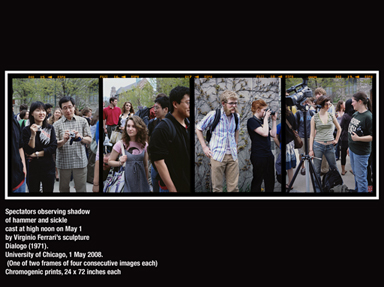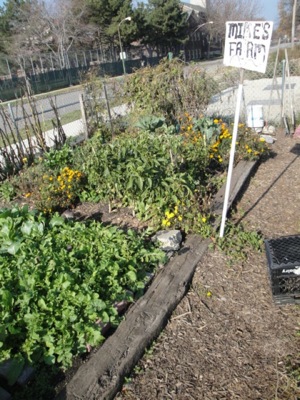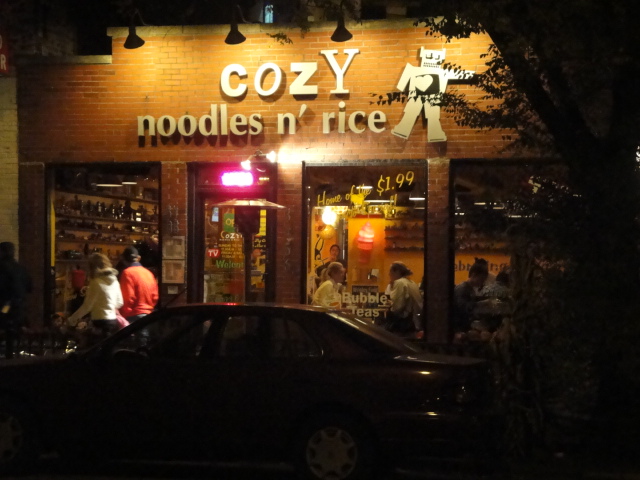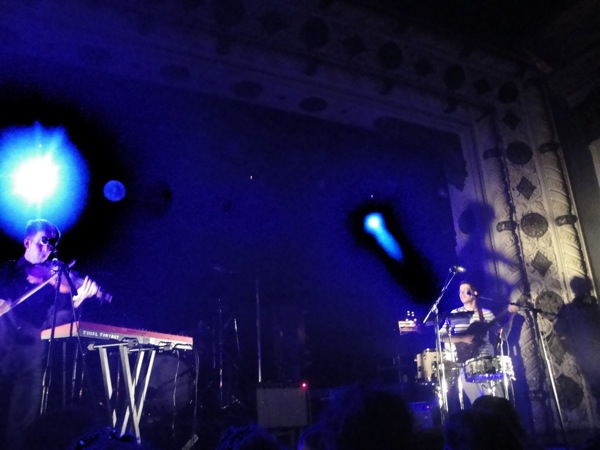Rachel Cromidas: November 2009 Archives
When I visited the headquarters of the Chicago News Cooperative in early November, the news room was barren, save a large reproduction of the company logo and a table covered in electronics. The sign has a simple sans serif typeface in black and red, and is as understated as the two rows of fresh-from-the-box IBMs and unused desk phones. The room also had a brand-new desktop printer in it when I arrived, but no paper, to the editor's dismay.
Though it comes from quiet beginnings and an only moderately-publicized deal between former editors of the LA Times and the Chicago Tribune, respectively, Jim O'Shea and James Warren, and the New York Times, the CNC is out in print. Expect to see more and more alternative coverage of Chicago politics and culture in the paper's Friday and Sunday print editions.
The CNC, as the website says, "produces public-interest journalism focused on Chicago, its politics and policy, culture and the arts, and the diverse communities of the metropolitan area." Look out for a more dynamic web presence in the new year, when the CNC "expects to launch a Web site that will be the hub of its operation, and introduce novel ways to connect the community with our news room in a two-way exchange of information."
More local journalism by some Chicago Tribune legends--your guess is as good as mine how this idealistic attempt to re-invent the 24-hour news cycle will pan out.
Local department stores are pulling out all the stops (along with some donuts, cash-prizes, goodies and give-aways) this Black Friday to lure shoppers, according to an article in today's Chicago Tribune. Here's a short list of some of the special offers for shoppers:
"The first 500 shoppers at Anthropologie get a receipt organizer from Real Simple magazine and a $10 store gift card."
Macy's shoppers will receive packs of Ocean Spray Craisins
Best Buy is offering coffee and doughnuts for early birds waiting in line ...
JC Penny will give you a free Disney snow globe to customers while supplies last
The City as a Resource for Learning
Courses: Winter 2010 - A list of classes in which you can study Chicago
This Winter, many UChicago students will be advising local
non-profits, driving along 100 miles of the
According to Bart Schultz, the director of the Civic
Knowledge Project and the teacher of next quarter's What is Civic Knowledge? and The
Chicago School of Philosophy, Chicago is a critical resource for students
of political and social movements. Though UChicago is sometimes known for its
cloistered campus and inward-focused lens, "part of the point of my courses is
to suggest that the actual history of the
In fact, the hands-on activities that his and other Chicago Studies course emphasis are exactly how Dewey wanted UChicago students to learn, he adds.
"Both courses offer the opportunity to combine classroom and
experiential learning... [the
Schultz is team-teaching What is Civic Knowledge? a special "Big Problems" course for College third- and fourth-years, with Margot Browning, Associate Director of the Franke Institute for the Humanities and Director of Big Problems.
"We really range across the history of
"We're not interested in teaching 'here are the three branches of government.' [Civic Knowledge] is actually about the basis for community organizing, civic friendship, a healthier and more participatory democracy," he says.
The Business of Nonprofits
In Debra Schwartz's class, the Business of Non-Profits, students will be doing more than studying community activism; they'll be consulting with and advising local non-profits and then presenting their work to the rest of the class. Schwartz will also bring local non-profit leaders in to speak to the class.
"We cover the history of the non-profit sector and, much of
it is rooted in work in
Like Schultz, Schwartz links the value of her course
material to
"Some of the most influential leaders were Jane Addams and
her colleagues, some of whom were on our faculty. One of the great insights
they had at the time was that
She adds: "I don't think you can get quite the depth of experience without this hands-on piece, if you want to really understand the role that a nonprofit plays and how difficult it is to do nonprofit work well."
Non-Profits is an
offshoot of the CS-RSO Campus Catalyst, and enrollment is limited to
participating students. The non-profits range from the
"It's a very diverse group of students," Schwartz said, ranging from Economics majors to Public Policy, Art History and Physics students. "I think it's great, because the kind of organizations we work with have diverse" services and goals.
Making Pictures
Judy Hoffman is bringing Chicago Studies to her Documentary Film Production class.
As part of this two-quarter-long sequence, students will work in groups to document either a portrait of a Chicagoan, a social issue or an historical narrative.
"This is a cinematic social inquiry, using the city as a laboratory for investigation," Hoffman says. "I try to encourage [my students] to get off campus and look at the city and its people, to figure out what really needs to be said."
Past projects have ranged from profiles of
"
Urban Geographers
Love for
The course, according to Conzen, will examine the role cities play in national and regional urban networks. He will lead students to the Regenstein library to view its collection of historical Chicago maps and documents, and on a hundred mile-long fieldtrip along the historical Illinois-Michigan Canal, stopping in the small towns "that make up the Chicago hinterlands" along the way.
Why make
Conzen says the benefits are clear:
We discussed the Renaissance Society's method of selecting contemporary artists for shows (it involves a platypus pelt, weighted coins, and rice, Walker insisted), and how the Polish-American experience relates to capitalism and globalization.
The exhibit even features a photograph of UChicago on May Day. Can you spot anyone you know?

"One photo in the Eastern corner of the gallery depicts what Sekula and Walker both call a peculiar campus ritual--University students and staff gather around to watch the high-noon shadow of Dialogo, the bronze sculpture by Virginio Ferrari in front of Pick Hall on May 1, which is rumored to form the shape of a hammer and sickle.
"That event with the shadow is just ready-made irony," Sekula said. "People come to see that rumored apparition of the hammer and sickle at noon on May Day. Some look to be more conservative, some to be more hip, young, politically liberal or left. I like to look at it as a physiognomy of the University community," he said; in that sense, the piece puts the University's conservative and liberal personas in tension, and suggests its role in global economic affairs.
The statue may not cast the exact shadow of a hammer and sickle, Walker adds, "But it's near enough to activate wishful thinking, which can't be discredited. Who would show up for this rumored event?" On the opposite wall is a photo of the 2009 May Day Parade in downtown Chicago. "You've got this working-class protest going on at exactly the same time--and you can see that the issues of immigration and labor rights are hopelessly intertwined.""
The exhibit is up through the end of Autumn Quarter (Dec. 13). The Renaissance Society is located at the fourth floor of Cobb Hall.
Story and Photos by Kat Li
Picture #1: All Are Welcome.
Just a couple of blocks east of the new South Campus dorms rests a beautiful community of growth and sharing. The community centers around the 61st St Community Garden, a green anomaly in the wasted, industrial expanse of the south side of Chicago. The garden hosts over 100 families in Hyde Park and Woodlawn; faculty from the university and long-time residents of the neighborhoods bring their families and friends together to this free, open space.

Picture #2: All of the residents will have to uproot their plots and personal ties to the garden very soon due to the university's plan to use the area as a staging site for construction vehicles.
Every Saturday, a farmer's market is held in the streets, allowing local businesses and gardeners to meet and exchange. As the days get colder, the market is moved into the Experimental Station, a building that serves as a venue and a kitchen for gardeners, community members, and whoever would like to rent out the space. Connected to the Experimental Station is Blackstone Bicycle Works, an after-school program for kids in the neighborhood that incorporates them into the business of bicycle-recycling and -repairing. All of the bikes from the university's new "ReCycles" rental program were made at Blackstone, and my own old-fashioned but perfectly functioning bike was a bargain at $65.
Earlier this afternoon, my friend and I walked over to the Backstory Cafe, where we enjoyed a buffet brunch of fresh food and a live jazz duo. Berry scones, spinach and pecan salad, candied pears with cottage cheese, buttery croissants, and apple cake were only some of the options on the table.
The community is a beautiful fact of life for the residents of Hyde Park and Woodlawn, as well as for the students and for the faculty of the university. But every time that I walk through the garden, meet a friend for a meal or a cup of tea at Backstory, or accompany a friend to peruse the market produce, I wonder if it will be the last time the community will really be a cohesive whole. With the garden gone and replaced by looming construction vehicles, transporting supplies in and out of the site, the area will be much less safe and much less welcoming. This community of neighbors is the only thing that brings the university and the south side residents together, the only consolidation for the university's dichotomous relationship with it's location. What will happen to our relationship after the garden is gone?
Picture #3: The garden community surrounds Andrew Carnegie elementary. These days there are always young neighborhood children running about, in and out of the bike shop, the cafe, and the garden. With the construction staging site, children will no longer be safe to play and explore in their own community.

To learn more about the garden visit the website dedicated to telling the stories of the garden and covering the issue with the university. This link will direct you to the video documentary interviews with the gardeners themselves: http://www.invisibleinstitute.com/stories/garden. And everyone keep an eye out for a special screening of a compiled documentary version of the story at Doc Films sometime in the near future.
Visit the garden. Eat at Backstory. Learn about bikes at Works. Say hi at the farmer's market. Become conscious of the beautiful community surrounding our campus; become a part of the neighborhood.
M. Div. student Gene Fojtik won first place, third-year in the College Justin Staple took second, and second-year in the College Alexandra Perez took third.
Did you miss your chance to submit a video in the first round? All students, faculty and staff are invited to submit more videos b Jan. 7, 2010 to compete in the Audience Favorite category.
Are you a creative writer with more to say about the Heartland? The "Heart of Chicago Writing Contest" co-sponsored by the Creative Writing Department, has extended its submission deadline to Nov. 30, 2009. Email katesoto@uchicago.edu to submit your stories.
When fourth-year Peter Smutko got hungry during his summer job, he would simply pull a ripe tomato out of the ground, brush the dirt off on his shirt, and eat it. Smutko received a crash-course in where food comes from and farm life while interning at Sandhill Organics as part of the Feeding the City: The Urban Food Chain program.
Work-days at Sandhill, a small-scale, local operation, began at 7 a.m. and ended around 5. In addition to collecting data to share with his classmates and Professor Pamela Martin back on campus in Autumn, Smutko weeded, harvested and planted the 40-some acres of zucchini, cucumber, carrots, kale, beets and asparagus with several other seasonal farm workers.
"Kneeling all day on my knees made me sore, but by the end of the summer none of it hurt," he says. The jobs may have been menial, "but none of it seemed onerous by the end. I felt like I had done something more substantial with my day," when the families participating in the farm's co-op would drive up to the farm to pick up their boxes of fresh produce each week.
Smutko was just one of more than a dozen University of Chicago students to intern on small farms throughout the state last summer, collecting data for the Feeding the City classes and group research project on the energy uses of small, diversified farms using sustainable growing practices, according to Martin, the project's leader and chief instructor, and Esther Bowen, the graduate student who devised of the program with Martin after researching the energy efficiency of local food productions with Martin as an undergraduate.
"What are the environmental impacts of specific types of agriculture, like greenhouse gas emissions or nutrient runoff?" Bowen, AB '08, asks. "The idea with Feeding the City is that students are involved in real research, and putting together more information about metropolitan food systems."
The program began in Winter, 2009, and is currently accepting interns from throughout the University for the 2010-2011 program.
Real Research
According to Martin, the program will change and improve over last year, principally because the new class will be able to analyze the data collected by current students in the program. So far, Martin says, the data suggests that small, sustainable farms have comparable energy and land efficiency to conventional, mono-crop farms--farms that are not organic and only harvest one or two types of crops (usually corn or soy). This is good news for environmental science researchers like Martin, and any student who is interested in examining how local food systems operate in Chicago.
The program is targeted toward students who are looking for some connection to environment or food in their studies, she adds. "For the science majors, the connection might be wanting to experience more of an applied science, and most of the Social Sciences people [in the class] are interested in the social aspects of food and wanted to understand more of the physical and environmental aspects of food. The key is we really want to have an interdisciplinary class," from math and economics to public policy.
"I'm a public policy major," Smutko says. What made this program stand out for him was the ability to work on a farm all summer and engage "with like minded students who are also into agricultural issues in general."
"We're gaining lots of practical knowledge that I think we generally miss out on as students," he says.
Interested in Feeding the City?
Please send (1) your resume, and (2) a page or less (double-spaced) describing your background and your interest in the program to:
Esther Bowen, Assistant Program Coordinator • eebowen@uchicago.edu
Materials must be received by 9th week Autumn Quarter. Decisions made as materials received. Please feel free to email with any questions about the program, or to discuss schedule flexibility issues. We look forward to hearing from you!
For more information, and to read students' blogs from their summers on the farm, visit Feeding the City.
It's been a little over a month since my last visit to Metro, several papers and midterms past, but getting off that same Red Line stop it felt as if no time had gone by at all. The academic workload can do that to you (not going to lie, I did bring Plato with me). After a dinner of Thai food and mango bubble tea at The Cozy Noodle, as well as a bit of wandering in and out of video game and frozen yogurt shops in the neighborhood, it was time to head over to Metro.

The Cozy Noodle is an adorable Thai food place just a block south of Metro. Wacky decorations but the friendliest hosts around. Get the Pad See Ewe, it's delicious.
It was a thinner crowd than the Grizzly Bear and Beach House show, but the people seemed just as filled with anticipation. There was luxurious standing room, and as Final Fantasy played their opening set, the theatrical lights had space between the bodies to reflect off the floor. Their set consisted mostly of unrecorded or unreleased songs, but Owen Pallett's chaotic looping style was present throughout the entire performance. The crowd stood silent but captivated as the shadows of the two members of Final Fantasy played largely on the stage behind them.
The performance was varied and unpredictable; there was shouting and drumming on toms, whispering and tumbling loop-recordings, dialogue and dancing. But the set was short, and much of the audience was left wishing they could have heard the familiar string and pop songs that had been stuck in their heads since listening to "This is the Dream of Win and Regime" and "Furniture" for the first time. The new stuff was definitely different, much less pop and much more tumbling bass and tom, but stays true to the same innovative theatrical chaos and focus on violin that attracts so many music-lovers.
The Mountain Goats came on with a surprising amount of robustness, at least, surprising to me. I remembered their music as very down-to-earth and minimalist in song-writing style, always bringing back memories of quiet road-tripping with friends through the farm and mountain towns of the northwest. But instead, they started their set with the standard, heavy rhythm and bass, nothing too different from the mainstream "rock" with downbeats and a chorus. The crowd was predominantly young people, all of whom seemed to have looked up and memorized every lyric before showing up at the venue. Throughout the set, I could hear the annunciation of the lyrics on all sides, and looking around every mouth was opening and closing in time to the song. No one cared that the lead singer looked like a middle-aged Google employee and the bassist was dressed to chaperone a senior prom, or that their blazers didn't quite match their Southern accents. The crowd was filled with energy and love for this band, and it was a spirit somewhat incomprehensible to me.

Final Fantasy's set up. It felt more like we were watching a theater production than a concert... in the most amazing way.
It's always hard to see a nostalgic band of yours lose it's original appeal. In this case, the band had changed a lot since recordings I'd kept, and it seemed everybody else had changed along with them. All of the character that I had loved in the first albums seemed lost in the heavy rock of their performance. But the music coming in and out of Chicago always has something for everybody, whether it's old or new, filled with character or lost to you.
Upcoming Shows:
Peter, Bjorn, and John at Metro, Thursday November 12th, 18+
Dirty Projectors at Bottom Lounge, Friday November 13th, 18+
Hyde Park Progress, an excellent local blog that focuses on economic development in the neighborhoods around campus, is holding a contest for students: Write a short blog post on the problems with the rental units or the management of Mac Properties, to balance the blog's usually favorable reports, and win dinner at a local sushi joint.
"We've heard grumblings among students that Hyde Park Progress is too soft on Mac Properties and Antheus Capital, and that we praise them too much for their investment in the neighborhood and their ambitious rehab projects," blogger Elizabeth Fama writes.
Well, here's your chance to vent. Here's your chance to counteract our glowing reports. Here's your chance to tell us about the seamy side of the student rental market."

Recent Comments
buy tao of badass on Remembering "The Killing Floor": A Look at Chicago's Labor Union History: Do you min
upload document on Much hospitality this weekend...: I was sugg
ragingbullalert.Info on Much hospitality this weekend...: This site
buy sonic producer on Remembering "The Killing Floor": A Look at Chicago's Labor Union History: I've gone
Juliane on The Year of the Jello Mold: Very great
selma web design on Haiti Earthquake Response: Hey there.
essay writer on SonicChicago: Voices from the Hyde Park Book Sale: Do you hav
VangSandra29 on SonicChicago: Voices from the Hyde Park Book Sale: Some time
Berlin Germany on 'You Gotta Go Get It': Caesarei Marsh of the Living Room Cafe in Woodlawn: I'd like t